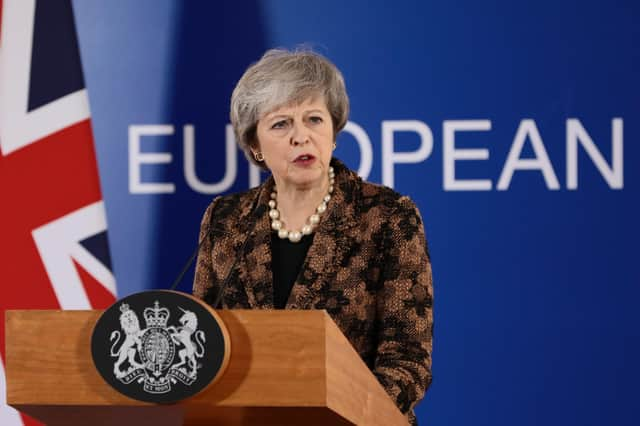Carla Lockhart: Theresa May’s backstop would have led to an Irish Sea border


It is untrue for Wilson Burgess (‘The Tories could not care about NI,’ April 26, see link below) to imply that Theresa May’s Brexit deal would have avoided a ‘border in the Irish Sea’.
Though Theresa May’s proposal was commonly referred to as an all-UK backstop this was misleading as the regulatory aspects of it applied to Northern Ireland alone.
Advertisement
Hide AdAdvertisement
Hide AdIndeed, it was because this deal could allow for regulatory divergence between Great Britain and Northern Ireland that most unionists including the DUP opposed the backstop.


The attorney general, Rt Hon Geoffrey Cox QC, in his legal advice to the prime minister on November 13 2018 clearly set out the position with regard to Theresa May’s backstop proposal.
He stated, “Northern Ireland will remain in the EU’s single market for goods and the EU’s customs regime, and will be required to apply and to comply with the relevant rules and standards. These include over 300 different legal instruments ...The implications of NI remaining in the EU single market for goods, while GB is not, is that for regulatory purposes GB is essentially treated as a third country by NI for goods passing from GB into NI. This means regulatory checks would have to take place between NI and GB...”
This present equivalent ‘regulatory’ Irish Sea border remains the source of the majority of the present practical and constitutional issues and the potential issues when further grace periods come to an end. Potentially this would have been exactly the same with Theresa May’s backstop.
Advertisement
Hide AdAdvertisement
Hide AdThe customs arrangements contained in Theresa May’s protocol involved the UK as a whole forming a customs territory with the EU, though as the attorney general concedes, “The arrangements as a whole will apply differently in GB and NI. … NI remains in the EU’s Customs Union, and will apply the whole of the customs acquis.” Even with these arrangements, in the words of the attorney general, “Goods passing from GB to NI will be subject to a declaration process.”
It is apparent that Theresa May’s protocol involved regulatory checks, a declaration process for goods passing from GB to NI, and Northern Ireland remaining subject to over 300 different EU legal instruments.
This is not consistent with stating that her arrangements would have avoided a border in the Irish Sea.
Carla Lockhart, DUP MP, Upper Bann
Letter: Arlene Foster should catch on that the Conservative Party could not care less about Northern Ireland
——— ———
A message from the Editor:
Advertisement
Hide AdAdvertisement
Hide AdThank you for reading this story on our website. While I have your attention, I also have an important request to make of you.
With the coronavirus lockdown having a major impact on many of our advertisers — and consequently the revenue we receive — we are more reliant than ever on you taking out a digital subscription.
Subscribe to newsletter.co.uk and enjoy unlimited access to the best Northern Ireland and UK news and information online and on our app. With a digital subscription, you can read more than 5 articles, see fewer ads, enjoy faster load times, and get access to exclusive newsletters and content. Visit https://www.newsletter.co.uk/subscriptions now to sign up.
Our journalism costs money and we rely on advertising, print and digital revenues to help to support them. By supporting us, we are able to support you in providing trusted, fact-checked content for this website.
Alistair Bushe
Editor